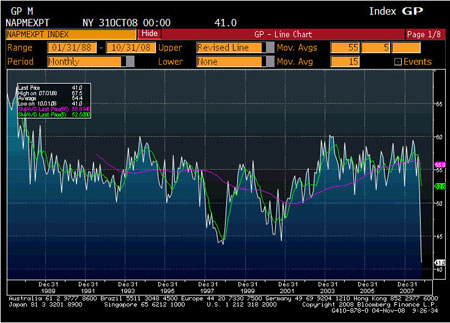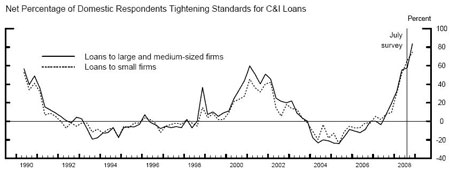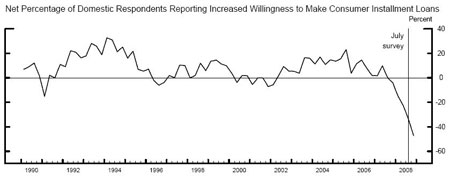So Election Day is finally here. To Macro Man, the key issue is not the identity of the new President, which seems to be a foregone conclusion, but rather the composition of the Senate. If the Democrats gain a filibuster-proof 60 senators, that will transform the US government into a British parliamentary-style “ruling party does whatever it wants” one-party system. Given that most US politicians from both sides of the political aisle seem to possess a singular ability to vote for a vested, rather than the national, interest, Macro Man would prefer to see an outcome that retains some element of checks and balances.
Regardless, as observed yesterday, winning today’s election could end up being something of a poisoned chalice. Certainly the state of the economy both domestically and internationally is in a dreadful state, and seems almost certain to get quite a bit worse before it gets better. Yesterday’s US was singularly awful, continuing a virtually unbroken skein of disappointing activity figures across the world.
Yesterday’s ISM was a shocker, with the headline and many of the components registering their lowest readings in more than a quarter century. Particularly disturbing was the export component, which absolutely fell off the edge of a cliff. Net exports have contributed fully two-thirds of overall US economic growth over the past two years; while some of this clearly represents a lower import bill due to weak domestic demand, but some is also a result of relatively buoyant foreign demand for US goods. No longer.
The RBA certainly seems concerned, as they cut rates by a greater-than-expected 75 bps overnight, despite the recent fiscal easing and exchange rate decline. The concern is that financial market distress is feeding through into the real economy, a trend that is evident just about everywhere in the world.
Certainly lending standards have tightened very dramatically, which is no doubt a reason for the cratering of global activity data. Yesterday’s Fed Senior Loan Officer Survey makes for grim reading. The proportion of loan officers who are tightening lending standards has risen to an all time high. While financial Calvinists might say “amen to that”, there is a difference between a prudent tightening of lending standards and a wholesale strangling of credit in the economy. This is also known as the difference between a recession and a depression. With banks desperately (and, to date, futilely) trying to delever and reduce the size of their balance sheet, there is a real risk of the latter scenario.
The consumer, obviously, is also under the cosh; financial institutions justifiably have little interest in extending loans at non-onerous terms.
Again, however, it is important to ensure that quality borrowers still have access to credit at an appropriate price (and no, Macro Man isn’t just saying that because he needs to roll over his mortgage.) A number of UK institutions have already announced that they aren’t going to pass through the entirety of any MPC rate cuts, and indeed have increase their base-rate tracker spreads.
So when the Bank cuts rates on Thursday, in all likelihood the effective borrowing rate to the consumer will not have changed, but the banks’ spread will have improved. This, in turn, provides the context through which institutions can attempt to earn their way out of this mess even as they try and discard non=performing assets.
And that is why the BOE and, almost certainly, the ECB will be cutting rates in two days.
- Bulenox: Get 45% to 91% OFF ... Use Discount Code: UNO
- Risk Our Money Not Yours | Get 50% to 90% OFF ... Use Discount Code: MMBVBKSM
Disclaimer: This page contains affiliate links. If you choose to make a purchase after clicking a link, we may receive a commission at no additional cost to you. Thank you for your support!





Leave a Reply